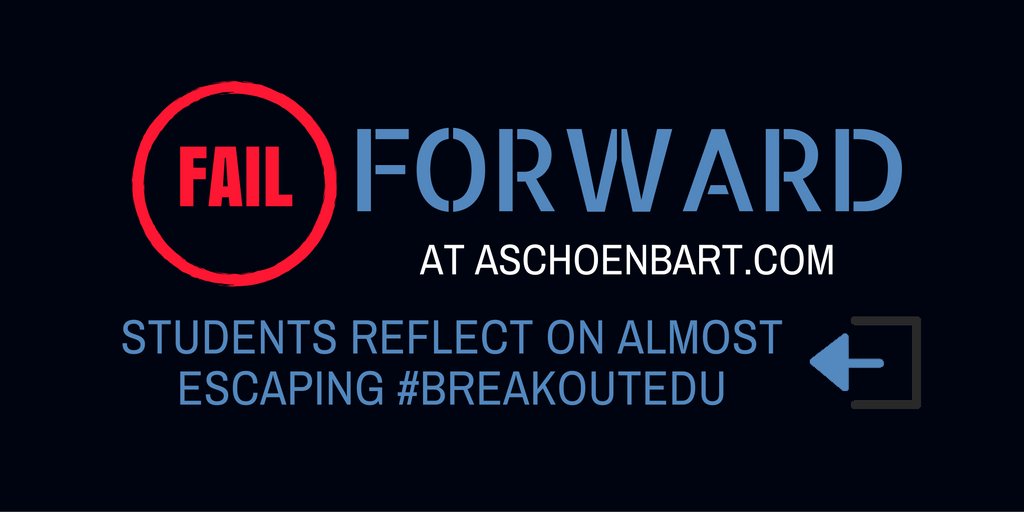Failing Forward: Students Reflect on Almost Escaping #BreakoutEDU


Last week, I facilitated a new kind of #BreakoutEDU experience. One where students succeeded or failed on their own with no help besides the standard hint cards. Unlock, solve, and stumble all on your own merits--and that’s probably the way it should be. But it can be hard to stand by and watch your students struggle to create meaning and find answers. That confusion is a part of the learning progress, though, and one that I want to better address in our future debriefs.
The situation was this: Working with another English teacher and his students, we facilitated two competing games of Time Warp with two Breakout kits. From the very first second, the students were into the game, finding puzzles, solving codes, and working together. It was some of the best and most efficient teamwork I’ve ever seen in a game. When the first team opened the first lockbox, the second team followed by seconds. The timer counted down, the music added intensity, and students pushed forward. Then, with about 5 minutes left, they hit a wall with the last two puzzles. They were so close, though. It was so hard not to nudge and push to help them succeed, but we had decided that failure needs to be a part of learning, too.
In the end, students almost broke out. We took our group picture and did a quick debrief. The classroom teacher, Mr. Bach, followed up with a full debrief the next day. Together, we walked through the second to last lock that stumped them all. But instead of giving away the last lock, which neither team had solved, I told the students that I would come back in a month with another game, they would try again, and this time would earn that last lock and break out.
I want all our students to be able to learn from failure and to grow. These students were so into the game that I worried about their responses to failure and to Breakouts as a whole. So after their class discussion, Mr. Bach asked them to complete a Google Form with two questions:
- What is your biggest take aways from your first BreakoutEDU experience?
- How do you feel about not succeeding in breaking out and not having the answers in the end?
Let’s see what they said. Below, find excerpts of student responses from their Time Warp Debrief.
- Even though I had felt super stressed at the time I was able to get to know my fellow classmates. This experience has taught me the value of teamwork and team building. This use of team building brought out a new side of people allowing them to use their most innovative responses to create a solution to a problem.
- My biggest take away from BreakoutEDU is that you can't always just look at things literally, and you have to take time to consider your options and the opinions of others to succeed. At one point my group could not figure out how to open the first lock, and we needed to use [redacted for game spoilers!], but it took us a few minutes to realize that that was the correct approach because the rest of us were set on our own ways.
- My biggest take away was learning to work with others and be patient when working with other people. Additionally taking your time plays a big role in being able to accomplish something. Although my group did not open the box we got close and with the use of managing our time and taking our time to focus on the clues, as well as listening to what others had to say or what they were thinking caused us to get close to succeeding.
- Organization and communication is key and when there's no organization nor communication things won't get done, and everything gets jumbled up, and then we get stuck on things; we could've had the second to last lock just one of our members didn't speak up and we failed. Critical thinking is another big take away, these puzzles aren't simple and need multiple minds to figure them out and need to use the clues given and offered carefully, and thoroughly examine what is given.
- My biggest take away is realizing how different people work together and that the key to success is taking advantage of these differences. An example of this is when one my team mates decided to look up the [redacted for game spoilers!] for there English translation and then relate it to the associated numbers in the English alphabet while others had not.
- My biggest take away is realizing how fast people start working together even if they have never spoken to each other in the past. I had a great time trying to solve it. I also learned how much working together really helps solving problems. Some people that I worked with I have never met but when we had to try solve the clues we started working together pretty well in the end.
- I felt frustrated because personally I do not like waiting for answers. This type of cliffhanger causes me to want to do this type of activity again. The experience was great and made me learn a lot about how to problem solve, not being able to succeed makes me want to keep working on this type of exercise for future tests.
- i feel like it wouldn't really matter since the crate was empty. The whole point was teamwork and not actually solving the puzzle. Due to this is guess they did a good job.
- I felt like we should've been able to do if we just took our time and calm down, because our group had the right code but we were rushing and thought we put it in, but i guess we didn't. So next time i'm going to try and tell my group to check everything they do so we don't mess up on something.
- The fact that we couldn't figure it out, was frustrating . The time was passing and more intensity came into our group. It was disappointing to not see what was inside the box. it was scary, but at the same time we had fun and we learned to communicate with others.
- It made me very frustrated that I was not able to break out, because I had spent all of that time trying to uncover clues and my group had only one lock left. Being that close to finishing and not being given the answer at the end was very frustrating. I'm very used to instant gratification, with being able to look up the answers to virtually all of the questions or problems I may have, but it was frustrating that I was not able to look up the answers and I was often stuck in a place of confusion and uncertainty.
- I felt extremely frustrated not being able to break out and not having the answers. I believe that if you start something, you should keep going and trying until you complete it. Our group had come so far in BreakoutEDU, that it was quite disappointing not being able to succeed. I believe that we should've been given some more time, thus will allow the group to really try hard and fortunately breakout. With only two locks remaining, our group had been completely upset, since we had completed so much.
- I felt unsatisfied and frustrated not knowing what was in the box, but actually solving the puzzles was very enjoyable. Leaving two locks and not being able to finish was disappointing. Especially having the intense music and a timer. 10/10 would definitely do another breakout.
- I'll be honest with you I was a little upset not being able to break out the suspenseful music and the countdown. It was very frustrating. Don't get me wrong it was an amazing experience working with friends using clues but when you don't finish on time you're just like darn where did I go wrong.
For me, the biggest takeaway is that it’s important for us to help students’ develop growth mindsets so that they can learn from and overcome failure. Each unlocked puzzle is a new opportunity for learning. I want to keep using tools like BreakoutEDU in my classroom and sharing them with other teachers as a coach to help create these real learning experiences.
This class in particular impressed me with their hard work, efficiency, and thoughtful reflections. I’m eager to see how they grow and improve in a few weeks and to incorporate more problem solving into my classes.
Tools and ideas to transform education. Sign up below.
How do you help students overcome failure (in BreakoutEDU and in life?). Share your ideas in the comments or on Twitter @MrSchoenbart.
cross posted at www.aschoenbart.com
Adam Schoenbart is a high school English teacher, Google Education Trainer, and EdD candidate in Educational Leadership. He teaches grades 10-12 in a 1:1 Chromebook classroom at Ossining High School in Westchester County, NY and received the 2014 LHRIC Teacher Pioneer Award for innovative uses of technology that change teaching and learning. Read more at The SchoenBlog and connect on Twitter @MrSchoenbart.
